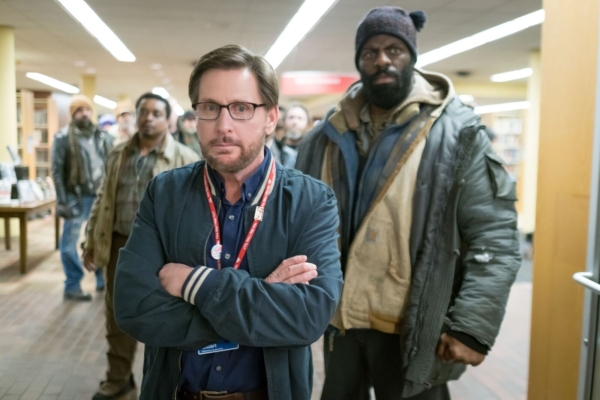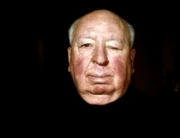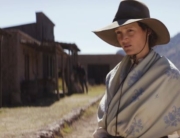Actor/director Emilio Estevez’s earnest, workmanlike paean to libraries and librarians, The Public, opens with a brief clip from a 1950s black-and-white educational film, the kind shown to high school students on Career Day. “Do you have a love of books and learning?” asks the sonorous narrator. “Do you like people, and do people like you?” Perhaps, the narrator suggests, the viewer should consider the vocation of the librarian. Cue the driving hip-hop soundtrack (Che “Rhymefest” Smith’s “Weaponized”), and the next shots take us to the chilly, gritty mean streets of downtown Cincinnati and a crowd of freezing patrons anxiously awaiting the opening of the main branch of the city’s public library.
Librarian Stuart Goodson (Estevez) arrives to find homeless eccentric Athena (a scene-stealing Dale Hodges) berating security guard Ernesto (Jacob Vargas) with anti-Semitic slurs. Stuart gently but firmly threatens Athena with a six-month banishment from the library if her unruly behavior continues. As the camera follows Stuart through his day, it becomes clear that his workplace is not the charmingly romanticized stereotype depicted by Hollywood in such classics as 1957’s Desk Set but a civic institution that finds itself on the frontlines of serious social issues: homelessness, mental illness, and the opioid epidemic. And librarians, as Stuart and his eco-conscious co-worker Myra (Jena Malone) acknowledge, are the unofficial first responders.
Stuart reluctantly becomes more involved the following evening when a group of homeless men, led by the sly Jackson (the charismatic Michael K. Williams), refuses to leave the library at closing time. “Tonight we occupy,” he triumphantly tells Stuart. The cold snap has worsened, and the city shelters are full. Why can’t they stay in the library for the night? The Public is not a shelter for the homeless, declares library director Anderson (Jeffrey Wright) in refusing his manager’s request. “But that is exactly what we are, every day of the week,” protests Stuart, and he rejoins his homeless patrons in barricading the third-floor social sciences department.
The peaceful sit-in turns into a standoff with police when crisis negotiator Bill Ramstead (a mannered Alec Baldwin) and mayoral candidate/district attorney Josh Davis (Christian Slater) arrive to take charge. Adding to the volatile mix is an ambitious reporter (Gabrielle Union) willing to distort a nonviolent situation to boost her ratings and Twitter followers.
Estevez addresses plenty of worthy ideas about the role of public libraries in American life, but good intentions don’t always make for great drama. He has rounded up a terrific cast, including a lively Taylor Schilling as Angela, Stuart’s potential love interest, but his actors are often reduced to didactic speeches (“libraries are the last bastion of democracy”), and poor Slater as the cartoonish heavy does his best in a one-dimensional role. Likewise, Estevez’s plotting suffers from contrivances; it’s not really much of a surprise that Ramstead’s missing addict son turns out to be one of the homeless men occupying the library. And the finale, involving nudity and a cappella singing of Johnny Nash’s 1972 hit “I Can See Clearly Now” comes across as slightly manipulative.
Still, when the Trump administration has eliminated funding for libraries from the federal budget for the third year in a row, Estevez’s film performs a valuable service in ripping up the clichés and portraying a real library and its impact on the public it serves. Evocatively shot at the Public Library of Cincinnati and Hamilton County by director of photography Juan Miguel Aspiroz, it’s an unglamorous but heartfelt study of an American institution. Librarians will love this movie.







Leave A Comment